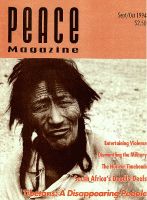
Peace Magazine Sep-Oct 1994, page 28. Some rights reserved.
Search for other articles by Kate Millett here
Review
Using a modified case study approach, Kate Millet gives us a comprehensive, unflinching portrait of the reality of incarceration and torture in the 20th century. She uses as her "texts" a selection of personal accounts by victims, amplified and set in context by her own reflections and analysis. The scope is world-wide, the implications horrendous. Millet dwells on the excruciating details of torture only enough to keep its reality closely in view. Her major intent is political: understanding of the origins and purposes of torture, its utility to the military establishments and political rulers of the countries where it flourishes.
We see torture as an outgrowth of imperialism, sharpened by racism: the French in Algeria, the British in Ireland, the Americans in Vietnam. We see it as an integral part of the sophisticated systems of human destruction in the Russian Gulag and in the Nazi death camps of the European Holocaust. We see its contemporary practice in the U.S. client states of Latin America (such as El Salvador): the development of the allpowerful National Security State, with special forces trained by American military personnel in "counter-insurgency" theory and practice. This combined legacy of Vietnam and the Cold War has proven particularly useful in containing subject populations, suppressing opposition, and discouraging dissent.
Millet probes beneath the surface manifestations to explore the underlying attitudes and biases and the entrenched institutions which permit torture to exist. Chief among these are the nation state itself, militarism, racism, and patriarchy. She makes it clear that none of us is innocent, we all bear some degree of responsibility for these shameful atrocities. We in Canada are not immune to this virus, which seems to be present (or potential) in the institution of militarism itself: witness the shocking behavior of Canadian troops in the Somali peace-keeping episode. There is probably, Millet reminds us, a cruel (and a passive) streak in us all, conditioned of course, not genetic, which allows us to acquiesce when we should protest, organize, and act.
Not only are torturers almost exclusively male, they display virulent macho and misogynous attitudes, and take special delight in demeaning and humiliating female victims. Sensitive observers and indeed some male victims have been able to realize a parallel between their experience and the agonies of everyday abuse inflicted on women by men. It is insights like these, facilitated by her cleareyed feminist view point, that make Millet's such a unique and powerful book.
Why does one study torture? How does one end torture?" Millet asks, and gives the answer: "One doesn't end torture, it is brought to an end. Slowly and with enormous effort, friction, energy..." But it is first necessary to provide knowledge, understanding, enlightenment-a basis from which to act. And this is what this brave, intelligent, passionate book succeeds so well in doing. Not an easy read, but a necessary one.

Peace Magazine Sep-Oct 1994, page 28. Some rights reserved.
Search for other articles by Kate Millett here